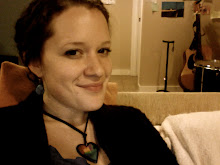Glenn Hooker was this smiley man's name, Australian Business Development Manager an Aussie VoIP provider, father and soccer coach to his 5 and 7 year old sons, and husband to his entreprenurial wife.
"What are you doing here in Florence?" I asked.
"Well actually, I just finished running a marathon in the Sahara Dessert, and I was on a team with a bunch of Italians, so I decided to finish up my trip with a week touring Italy."
"Wait, what?! A marathon in the Sahara? Was there some sort of cause involved?"
"Actually, yes." And then like it was just part of his daily life he said, "The marathon was to raise money and awareness about the situation of the Saharawi people. I spent a week living with them in their refugee camps and learning about their struggle, and now my whole mission is to go home and educate people about their situation"
Obviously intrigued I said, "Well, here's the chance to start...let's hear it."

(Saharawi Refugee Camp. photo stolen from www.medea.be)
And that's when the whole story came out. For the next 45 minutes Glenn and I walked and talked, as he told me the story of his experience living with the Saharawi people in mud huts and tents in the Smara and Dajla camps of Algeria. He told me about the kindness, toughness, and brightly spirited personalities of the Saharawi people. About the unbearable heat that was apparently "ideal" compared to sandstorms of past marathons that wiped out the entire camp in a matter of hours. About the community garden that was a few hundred square meters; not large enough to feed the 30,000+ people living in Dajla, but good for the spirit of self-sufficiency. And then he told me the politics of the situation--what I hate hearing the most because I hear it all too often--the story of thousands of innocent people oppressed and violated due to greed, money, and a hollowness that easily forgets the value of human beings. The reason why this marathon was needed.
Glenn did his part to pass along his knowledge of this situation to me, and now it's my turn to pass that knowledge to you. Here is a quick summary of the background of the Saharawi refugee camps in Algeria--one of the only places in the world the UN acknowledges as non-self governing. (Thank you Glenn, for providing most of this information).
It's the late 19th Century and Europeans are colonizing all over Africa when Spain claims the land occupied by the Saharawi's, the indigenous people of the Western Sahara. Saharawi nationalists fought through the 1950's, 60's and 70's to reclaim their land, even forming their own representative group, the POLISARIO. In 1975, the POLISARIO were on the verge of independence, when Spain signed a clandestine treaty with Morocco and Mauritania to split the land into three instead of granting liberation. (The Saharawi people were one of Morocco's biggest allies in their struggle for independence from the French, by the way).
The result led to an unfortunate armed struggle and tens of thousands of Saharawis fled their homes in Western Sahara as Morocco dropped American napalm and phosphorous bombs on civilians. Facing aggression from countries both north and south, the fleeing Saharawis turned east, to Algeria. There, they were granted asylum and began to build refugee camps in an area of the desert considered uninhabitable. The task of creating a new life in exile fell to the women while the men remained at battle. Saharawi women developed committees and systems for health care, education, day care, social affairs, resource distribution and played an active role in the political process.
Today, most of the indigenous people of the Western Sahara continue to live in the refugee camps set up during a time of struggle. 80% are women or children, and despite living with conditions considered "inhospitable", these spirited people would rather endure and chose a life in exile, than live under the rule of a government whose reign has sought to erase their existence. (http://www.wsahara.net/camps.html)
A referendum to decide the fate of the country has been proposed and accepted by the UN, but has never come to pass. What can we do? Raising global awareness will play a significant role in forging a resolution and ending the suffering of the Saharawis who face gross human rights abuses in the occupied areas.
Sometimes as Americans we let our geographic isolation keep us from international awareness. But if Glenn Hooker living in Australia can make the choice to leave his comfort zone and explore the challenging realities of a foreign group of people, we can try to do the same. After writing me an impressive list of triatholons, iron man races, and marathons that he's previously participated in, Glenn wrote to me in our most recent e-mail, "Anyway, if I can particpate in a few of these challenges that have great causes behind them then it's happy days!" To me, this statement captures quite well Glenn's lighthearted but also serious committment to doing good in the world, and I feel truly inspired.
Please, share this story with others. And if you have any stories you think people ought to know about, send me an e-mail and take some space here as a guest blogger.
To learn more about the Saharawi situation, check out these websites:
http://www.wsahara.net/camps.html (history, geography, etc)
http://www.waronwant.org/Profiting20from20the20Occupation3AOther20Resources+10860.twl (politics, corruption, etc)
http://www.rjr.ru.ac.za/rjrpdf/rjr_no27/Sahawari_struggle.pdf (a first hand story of the struggle)
http://travel.webshots.com/album/558320295cWgAvC (pictures)
My heart is heavy and aching today with compassion, a tinge of sadness, and that unavoidable thing called HOPE after reading through tons of articles and looking over too many pictures. Thanks for spreading the word...
Peace,
Rachael
PS--Apologies for being so disconnected from this blog lately. I only have 3 weeks left in Florence and I'm soaking in as much as possible. I'll try to update about my spring break in Ireland, along with other amazing experiences soon. All my love!

No comments:
Post a Comment